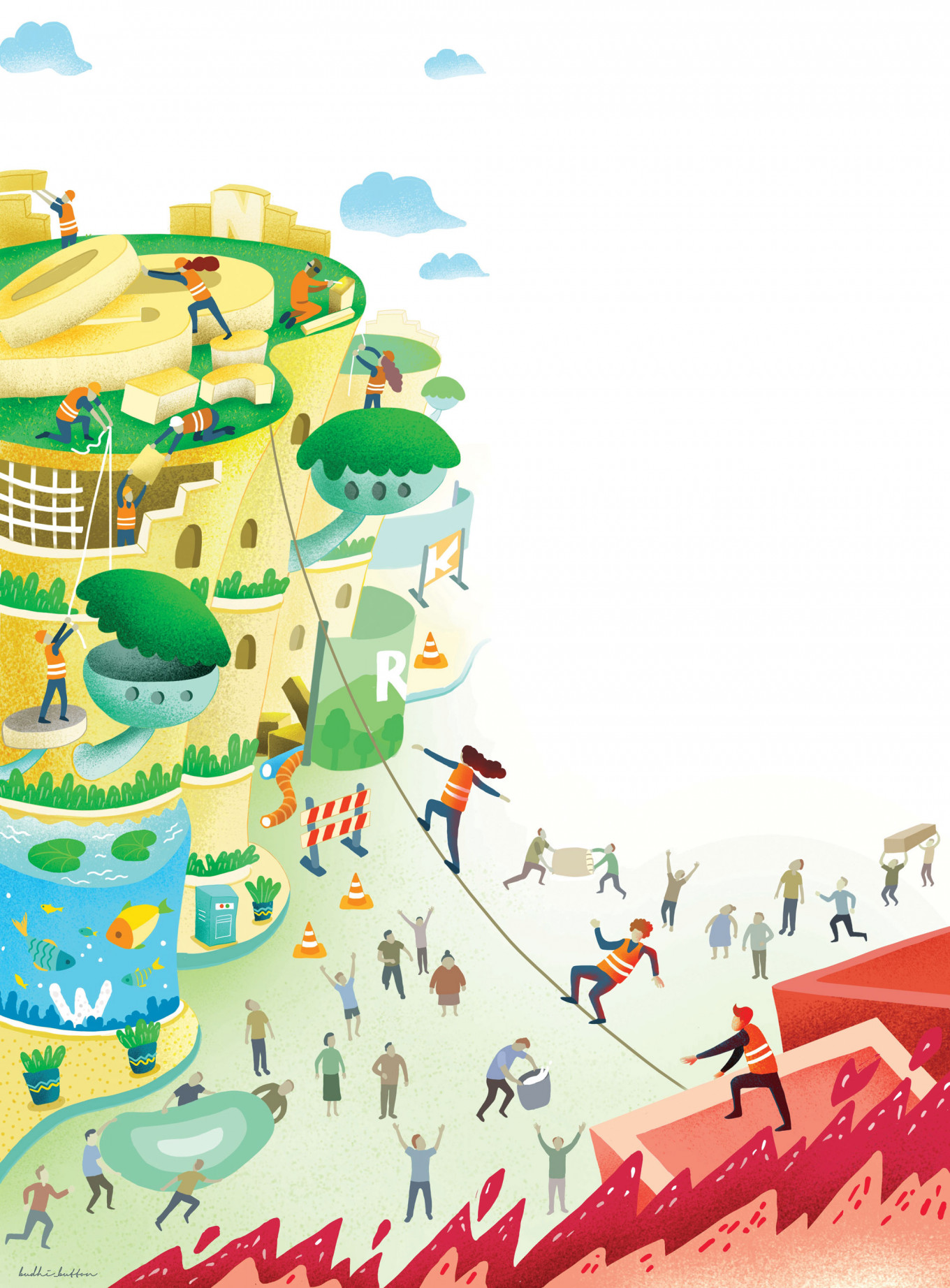In an era where the global climate crisis looms large, tech-savvy entrepreneurs from the generation often dismissed for being perpetually glued to their screens are leveraging their digital prowess to spearhead innovative environmental solutions.
From conserving water and reducing plastic waste to tracking carbon footprints, start-up founders hailing from Generation Z and young Millennials are transforming their eco-anxiety into constructive action.
“As digital natives, we are just more sensitive and can absorb information faster than our parents’ generation, making us more aware of environmental issues,” Mirta Khairunissa, cofounder CEO of carbon footprint tracker app Tracco, tells The Jakarta Post.
Growing up with social media, they have been continually exposed to reports and discussions about the climate crisis, heightening their awareness of and engagement with related environmental issues.
Instead of apathy, however, Mirta and others from her generation have imbibed an environmentally conscious, can-do spirit: “I want to influence the issue I care about the most,” the 25-year-old says.
Tracco, which she created in 2023 with friends she met at the Apple Developer Academy, aims to address the low public awareness of the amount of carbon we emit from our daily commute. In the app, you can track and calculate your transportation emissions and offset them through actionable steps like planting trees.

Thank you!
For signing up to our newsletter.
Please check your email for your newsletter subscription.
“This focus on personal impact resonates with a generation comfortable with translating online knowledge into tangible actions,” Mirta explains.
But she also acknowledges the limitations of individual efforts.
Mirta believes the hopelessness perpetuated by endless social media content about impending doom – “Since the world is ending, what’s the point of recycling?” – must shift to an empowering thread of collective climate consciousness.
“I hope we don’t belittle any efforts to make the world a better place,” she adds.
This also prompted her to expand her services to include a consultancy feature that allows companies to calculate employee carbon emissions.
“Now, we can make them ‘pay’ for it,” she says, using the term loosely to suggest that taking responsibility for emissions serves a dual purpose: ensuring Tracco’s financial sustainability while holding older generations accountable through youth-led initiatives.
“Corporations are often run by those in power, but they might also be among those apathetic to climate change. I want to bridge that gap and break the 'let Gen Z handle it’ narrative,” Mirta emphasizes.
Read also: Intuition and innovation: How to keep a 140-year-old Swiss watchmaker relevant
From anxiety to action
This frustration is common among a generation of people that are young enough to worry about suffering the full impact of the looming climate crisis, yet old enough to understand the irresponsibility and inaction that led the world to this point.
But instead of responding with apathy, young tech founders are channeling their growing sense of climate anxiety into concrete actions.
Sabrina Farah Salsabilla, the 25-year-old chief marketing officer of water conservation start-up Reservoair, finds it “infuriating and puzzling” to see unfulfilled government promises related to flood management, an issue she cares deeply about.
“I was taught that there are, for instance, six ways to handle floods. While the government implements the first [three], the other [three] are merely mentioned but never executed,” she tells the Post.
Fueled by her frustration during her university studies, she created SolusiBanjir.id, a social enterprise that aims to address flood disasters. This venture became a stepping stone to her current focus on water solutions with Reservoair, founded in 2022.
“Water is often overlooked in energy conservation efforts,” Sabrina says. “We can only see the impact of water conservation in 50 years; it isn’t as immediate as something like waste management. That’s the gap I want to fill.”
She adds that start-ups can address gaps left by traditional approaches to complex issues, noting that “people my age are more active” in filling these deficiencies.
As a Gen Zer, Sabrina emphasizes the advantage of youth: “We’re still young and constantly learning how to measure impact and educate the public on water conservation.”
She continues to educate the nascent market on the growing demand for water conservation along with impact measurement, which is still being developed and researched.
“We have time to figure it out,” Sabrina assures.
Similarly, 30-year-old Bintang Ekananda tackles his eco-anxiety through Alner, a company he cofounded to fight single-use plastics by focusing on returnable and reusable plastic packaging.
He feels “a sense of responsibility” to contribute to the growing movement of young climate innovators, Bintang says.
“Seeing many young [entrepreneurs] involved in sustainable start-ups gives hope,” he says, describing young leaders as people who are “striving to be the change”, rather than waiting for change to come.
Studies show that exposure to environment-related online content gives rise to environmental concerns, and social media provides a unique space for nurturing public opinion on any issue to drive the powerful discourses seen today.
As part of the digital native ecosystem, Bintang believes he has an advantage in communicating and understanding the needs and preferences of younger audiences, a crucial market for products and services advertised online.
Yet, even though global awareness of climate change is spurring investor interest in sustainability initiatives, Bintang underlines that funding remains a major hurdle: “Many investors are still skeptical about the profit potential of climate-focused initiatives.”
Read also: Dining at ESA: Dégustation, Jakarta style
Funding support wanted
Jonathan Davy, 30-year-old cofounder CEO of climate-focused venture builder Ecoxyztem, identifies a critical gap in investment opportunities: a mismatch between innovations and financing options.
“Many Indonesian start-ups with promising innovations are underfunded and struggling to scale up due to lack of critical domestic financing,” he says.
Funding rounds in Indonesia typically average around US$500,000, a stark contrast to the $5 million that similar ventures can secure abroad. Jonathan says this disparity significantly hampers the growth potential of green technologies, often dubbed “deep” or “hard” tech, of which advancements in science and engineering are crucial for tackling climate change.
He also explains that today’s clean technology landscape differs markedly from the 2008 bubble, when venture capital firms faced significant losses due to the high risks and prolonged development cycles associated with such businesses.
“We're seeing a new wave of clean tech that’s far more promising,” says Jonathan. “This is driven by new technologies, fresh innovation and most importantly, affordability.”
He points to solar panels as one example: while the technology had existed for decades, widespread adoption was driven by recent advancements in affordability.
Renewables are now the cheapest energy sources, according to the International Renewable Energy Agency (IREA), and solar is poised to become the most affordable energy source in most regions by 2030.
Additionally, innovative business models like energy as a service (EaaS) and other creative financing solutions make clean tech “more accessible than ever”, Jonathan says, leading to a more viable environment for eco-entrepreneurs.
“This is a positive sign,” Jonathan says. "Ecopreneurship is moving in the right direction. We need to tackle climate change and economic growth simultaneously; they must go hand in hand.”
He emphasizes that eco-businesses must not only be environmentally friendly but also economically sound to maximize their impact.
“In Indonesia's tech market, that isn't mature yet,” he adds, “I see the young generation showing incredible determination to open new markets and create significant impact.”
Policy support needed
Aside from private funding sources, green tech start-ups also need much more from the government in terms of supporting policies.
Jessica Novia, cofounder of blue ecosystem conservation start-up CarbonEthics, says the lack of policy and regulatory frameworks has been a major obstacle in supporting the carbon market in Indonesia, which aims to achieve carbon neutrality by 2060.
“We’re actively engaging with the government and relevant stakeholders to advocate for climate initiatives, and hope to turn it into reality,” Jessica says.
As a young founder in her early 30s, she sees her generation bringing “fresh perspectives and innovative ideas” to entrepreneurship.
“We're not bound by traditional thinking and are more willing to take risks. We've leveraged these advantages to gain access to mentorship and funding from organizations focused on conservation and sustainability,” she says.
“More young founders working on climate [solutions] means more employment for young people to work on climate as well,” she adds.
CarbonEthics, which Jessica and her partners founded in 2019, helps institutions, businesses and individuals to decarbonize by leveraging Indonesia’s blue carbon potential.
Home to the world's largest mangrove forest, the country ranks among those most vulnerable to climate risk, in particular severe flooding and extreme heat. With 132 million Indonesians living in coastal areas, it is particularly vulnerable to sea level rise.
“I wish to see more and more people working to create a world where sustainability is not a trend anymore, but mainstream,” Jessica says.
It is a call to all generations to step up and support their efforts. If no one else does, perhaps Gen Zers will indeed end up having to handle the climate crisis on their own.
Read also: A brief atlas of under-the-radar islands
This article is part of The Weekender, a biweekly tabloid that appears in the Saturday edition of The Jakarta Post. Offering a variety of feature articles on lifestyle and culture, it aims to enriching your reading experience. Subscribe here to access The Jakarta Post's Saturday edition and all Premium content.






















